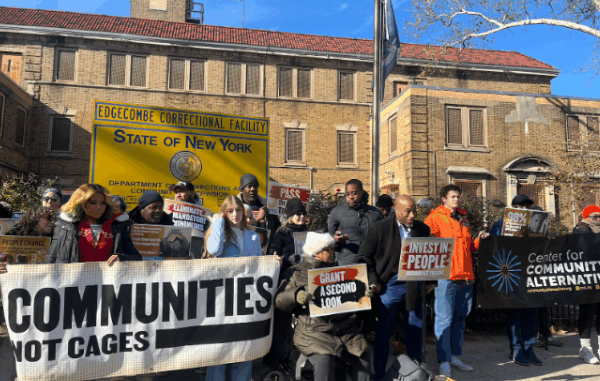
BY SARAH O’CONNELL
Demanding the passage of state sentencing reform legislation, criminal justice activists and elected officials rallied on November 18 in front of Edgecombe Correctional Facility, a low-security prison in Washington Heights.
The advocates called for passage of three bills in the 2026 legislative session: the Second Look Act, the Marvin Mayfield Act, and the Earned Time Act. The Center for Community Alternatives (CCA) organized the Manhattan rally as well as similar rallies in seven other cities as part of its state-wide Communities not Cages campaign.
“This is our moment,” said Patrick Stephens, Youth Services Leadership Fellow at CCA, a nonprofit supporting New Yorkers affected by mass incarceration. “After decades of unjust racism, unjust sentencing laws, we are closer than ever to meaningful change.” Out of the more than 30,000 New Yorkers currently incarcerated, nearly three out of four are Black or Brown.
Speakers at the rally spoke about the high cost of incarceration – with New York state spending $70,000 yearly to incarcerate a single person in state prison, totaling $3 billion spent annually, funds that many speakers said could be better spent on community services.
“Can we afford to invest more in incarceration than we do in education? No,” said Senator Zellnor Myrie, citing that New York State spends only $36,000 on education per public school student yearly. Other elected officials who spoke were Senators Jessica Ramos and Cordell Cleare, and Assemblymembers Landon Dais, Latrice Walker, and Monique Chandler-Waterman.
Formerly incarcerated advocates spoke about how their experiences led them to advocate for criminal justice reform. Father and CCA organizer David Hopper called for the passage of the Marvin Mayfield Act, which would eliminate mandatory minimum sentences.
When Hopper was convicted, he faced anywhere from eight to 25 years in prison because of mandatory minimum sentencing laws. He was offered a plea bargain of five years, but he wanted to go to trial. His lawyer urged him to take the plea deal instead, and when he did, he was sentenced to seven years, in what he called “coercion” to take the deal.
Prosecutors’ “discretion of sentencing, and their eagerness to raise their conviction rate, leaves the accused at a disadvantage,” said Hopper. “The prosecutor’s aim is to look us up, lock us up.” Currently, 98% of convictions come through guilty pleas in New York State.
The population of individuals in New York State serving life sentences is the third-highest in the country, almost 9,000 people. Advocates hope to change this through the Second Look Act, which would ensure excessive sentences are reviewed by judges. The bill would also give incarcerated people the ability to apply for a resentencing hearing after they have served 10 years.
Percy West was given a 132-year-to-life sentence at only 19 years old, after declining to accept a plea deal. After serving 33 years, it was revealed that evidence was not presented to the trial judge who sentenced West as a teenager. New York State Supreme Court and the Brooklyn District Attorney’s Office reviewed the case and resentenced him to 25 years to life, allowing Percy to be released immediately on parole at the age of 51. The Second Look Act would make this possible for more people throughout the state.
“We have to make a change,” West said. “These are the people who are languishing in prison after they have already established they are ready for society. We have to get them home.”
Advocates also called for passage of the Earned Time Act, which would allow all incarcerated people to earn good time and merit time, regardless of conviction, which New York restricted in the 1990s.
The bills have faced criticism as too “radical” or soft on crime. “We understand firsthand the devastation that crime has in our community,” said Assemblymember Dais. “However, we do understand that we can be tough on crime, and at the same time be just in criminal and social justice reform.” He added that he wanted to see communities come together and heal, but that it can’t happen while many remain incarcerated.
Senator Ramos responded that the legislation did not come out of abstract ideas, but the knowledge that both people and systems can change. “There’s a humanitarian crisis in our prisons,” said Ramos. “And when there’s a crisis, we don’t look away. We have to fix it.”
